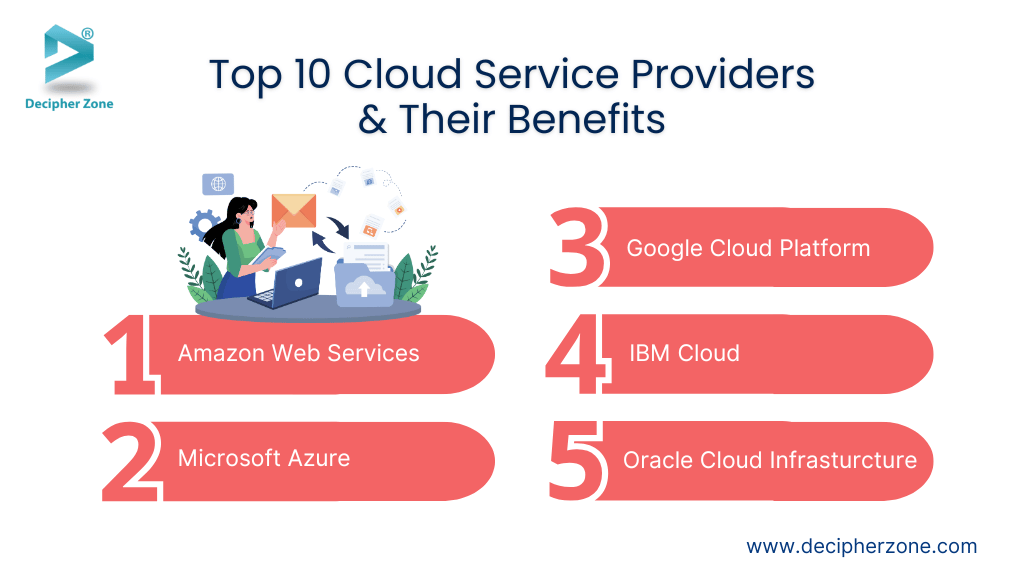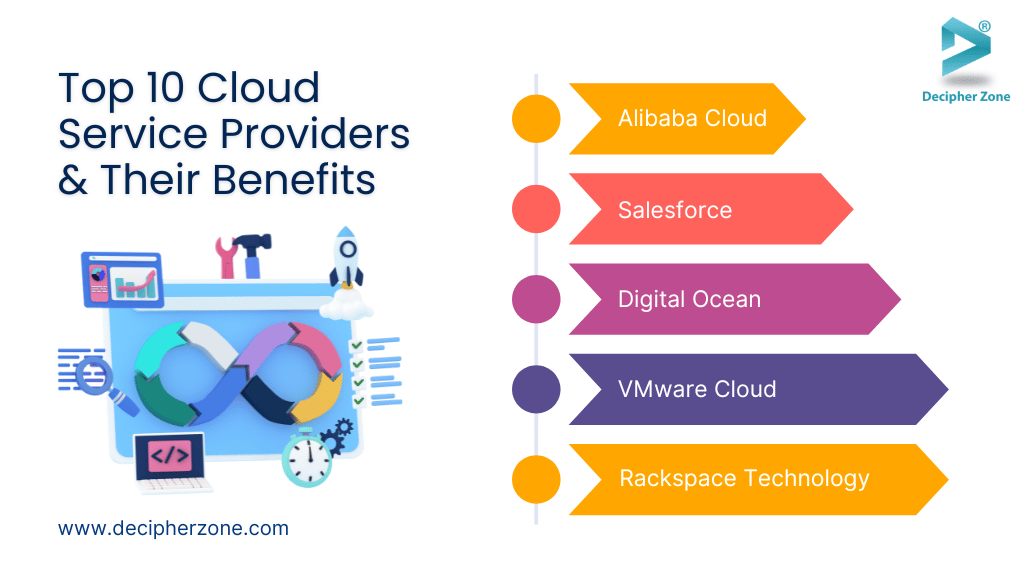Get your hands on this comprehensive guide that provides the top 10 cloud software services with the benefits. With cloud service providers you get all the good stuff like hosting, storage, and app deployment, making it super flexible, cost-efficient, and scalable. Choose the most ideal cloud service provider tailored to your needs.
Cloud computing empowers developers and businesses to deliver on-demand resources, boosts scalability, and cost-efficiency, and stay competitive in the dynamic market. Utilizing the benefits of cloud computing, businesses can revolutionize the way they build, deploy, and scale software solutions.
Cloud service providers are the preferred choice for startups and businesses that are looking to speed up their scalable software development solutions since these cloud services provide flexibility.
Whether it’s simplifying data management, supporting distributed teams, or offering real-time updates, cloud computing is smoothly integrated into every stage of the software development process.
The growing dominance of these top cloud service providers including Google Cloud Platform (GCP), Amazon Cloud Services, Azure Cloud Services, and more highlights the importance of choosing the right partner to meet specific business needs.
This blog sheds light on the top cloud service providers and the major players. You can get your hands on the diverse cloud services tailored to microservices architecture, containerization, and AI-driven solutions.
By exploring their benefits, you’ll understand why they are crucial for creating scalable, flexible, and future-proof solutions.
10 Best Cloud Service Providers for Scalable Software Development Solutions
There are more than 1,000 cloud service providers globally. However, choosing the right cloud services is essential. Here are the top 10 cloud service providers to explore and understand their services and features of each to choose from.
1. Amazon Web Services (AWS)
Amazon Web Services is an ample cloud computing platform, known for its emphasis on IaaS which is supported by its Amazon EC2 (Elastic Compute Service), Amazon S3 for storage (Simple Storage Service), and Amazon RDS for database (Relational Database Service).
AWS Cloud Services offers 175 fully-featured services to meet all business requirements. The applications built on AWS are scalable, flexible, reliable, secure, and steadfast.
Benefits:
-
Best for public cloud.
-
AWS offers elastic capabilities that allow applications to adapt without performance hiccups and supports seamless scaling for businesses even for handling a surge in demand or managing steady growth.
-
AWS cloud service is ideal for businesses that have tight budgets as it offers to pay only for what you are using with no upfront investment.
-
Its global data center network ensures low latency and high availability which provide businesses with reach over the world for their applications.
2. Microsoft Azure
Microsoft Azure is a cloud platform that offers a robust platform tailored for businesses that rely on the Microsoft ecosystem. It integrates seamlessly with Microsoft products and services, Azure provides unmatched compatibility which makes it ideal for developer solutions and using tools like Windows Server, Active Directory, and Office 365.
Benefits:
-
Azure cloud services have built-in support for .NET and Windows Applications, ensuring developers can build, migrate, and scale their solutions seamlessly within a familiar environment.
-
It provides powerful AI tools like Azure Cognitive Services and Azure Machine Learning, allowing businesses to integrate intelligent solutions into their applications effortlessly.
-
It provides strong security and compliance like multi-factor authentication, advanced threat detection, and compliance with industry standards including GDPR, HIPAA, and ISO 27001.
3. Google Cloud Platform (GCP)
Google Cloud Platform provides cloud computing services that run on the same infrastructure that Google uses internally, offering tools for AI, machine learning, and big data analytics.
This delivers unmatched expertise in data and search technologies, enabling businesses to use the power of data-driven decision-making.

Benefits:
-
It is easy for businesses to process vast amounts of data, gain actionable insights, and deploy intelligent models without extensive infrastructure investment.
-
The pricing is highly competitive allowing businesses to run non-critical workloads at significantly reduced costs.
-
It provides unparalleled support for containerized apps through services like Google Kubernetes Engine (GKE), simplifying orchestration, deployment, and scalability.
-
It allows developers to integrate AI-powered features effortlessly that improve user experience and operational efficiency.
4. IBM Cloud
IBM Cloud Services combines platform as a service (PaaS) and infrastructure as a service (IaaS) to offer a wide range of cloud solutions. It offers tailored services for highly regulated industries that ensure compliance, security, and reliability.
With the focus on innovation, IBM Cloud is an ideal choice for businesses looking to integrate AI, analytics, and hybrid capabilities into their operations.
Benefits:
-
It prioritizes data security with encryption technologies, secure key management, and protection against evolving threats.
-
Watson AI allows businesses to integrate machine learning and natural language processing capabilities into their applications boosting decision-making, customer interactions, and operational efficiency.
-
Seamless hybrid cloud integration allows businesses to modernize legacy systems, manage workloads across environments, and achieve scalability without disrupting existing infrastructure.
5. Oracle Cloud Infrasturcture (OCI)
Oracle Cloud Infrastructure (OCI) offers an optimized environment for mission-critical workloads which allows businesses to achieve speed, scalability, and security across their cloud infrastructure.
It is designed to provide high-performance computing and database workloads for businesses requiring robust, reliable, and secure cloud software solutions.
Benefits:
-
It is finely tuned to support Oracle databases like Oracle Autonomous Database ensures seamless performance and tight integration with business applications, improving overall performance.
-
Its low total cost of ownership makes it an attractive choice for businesses looking to optimize their cloud infrastructure while maintaining financial control.
-
OCI seamlessly integrates with Oracle’s full suite of apps such as ERP, CRM, and HR software solutions, offering a unified cloud experience that improves operational efficiency and data sharing across business units.
-
It facilitates hybrid cloud strategies with various tools, allowing businesses to run workloads across multiple cloud platforms while maintaining a cohesive and unified IT infrastructure.
6. Alibaba Cloud
Alibaba Cloud is known for its innovation in eCommerce, IoT, and big data, combining its expertise in technology with a deep understanding of market demands. It focuses on providing flexible solutions for various business needs expanding its influence globally for all-sized businesses. This makes it a trustworthy choice for businesses.
Benefits:
-
It provides competitive pricing with scalable options tailored to meet the needs of both startups and large businesses.
-
It offers specialized solutions for faster website performance (Content Delivery Networks) and for building intelligent (IoT platforms) connected ecosystems particularly beneficial for retailers and manufacturers aiming to modernize their operations.
-
It ensures low latency, reliable uptime, and seamless cross-border operations for global businesses across Asia, Europe, The Americas, and the Middle East.
7. Salesforce
Salesforce Cloud is a CRM (customer relationship management platform that allows businesses to build scalable, data-driven applications. It provides tools for sales, marketing, and service, with a commitment to innovation and user-centric design.
Salesforce offers powerful ecosystems for app development, business automation, and seamless integration which makes it the top choice for businesses across industries.

Benefits:
-
Businesses using Salesforce CRM, Marketing Cloud, or Service Cloud benefit from native integrations which allow a unified flow of data and processes across departments with a holistic view of customer interactions and streamlined operations.
-
Developers can work with multiple programming languages like Python, Ruby, Node.js, and Java. This allows them to choose the tools that best fit their project needs.
-
With the help of built-in AI with Einstein analytics businesses make data-driven decisions, improve customer service, and personalize user experience.
-
Salesforce AppExchange is a rich ecosystem that offers thousands of prebuilt apps and components. This helps businesses to extend their capabilities without reinventing the wheel and supports faster innovation and implementation.
-
This is a trusted choice for sensitive data management as it complies with major regulatory standards like GDPR, HIPAA, and ISO 27001, along with multi-factor authentication, encryption, and strong access controls.
8. Digital Ocean
Digital Ocean is the ideal choice for startups, small and medium businesses, and individual developers as this cloud platform is developer-centric that focuses on simplicity and ease of use.
It offers a set of tools and a user-friendly interface that allows developers to quickly build, deploy, and scale applications without the complexity especially associated with large cloud providers.
Benefits:
-
It offers competitive, transparent pricing with flexible plans that allow teams to scale efficiently without breaking the bank, providing a great entry point for new projects.
-
It allows developers to deploy and manage their applications within minutes with the help of features like an intuitive control panel, preconfigured virtual machines, and one-click apps.
-
It eliminates the need for manual management and allows developers to focus on building apps rather than maintaining infrastructure with fully managed services for databases like PostgreSQL, MySQL, and Redic.
9. VMware Cloud
VMware Cloud integration of on-premises and cloud environments allows businesses to efficiently manage workloads, prioritizing flexibility, scalability, and continuity across hybrid and multi-cloud setups.
It specializes in virtualization and hybrid cloud solutions which makes it a leader in modernizing its IT structure.
Benefits:
-
It simplifies the transition to the cloud with tools with easy migration of existing workloads to the cloud ensuring business continuity and reducing the challenges associated with cloud adoption.
-
It offers a unified framework for managing and optimizing workloads and its hybrid capabilities allow businesses to run workloads on both private and public clouds.
-
It provides strong disaster recovery solutions like VMware Site Recovery that ensure data resilience and minimize downtime during disruptions.
10. Rackspace Technology
Rackspace cloud service provider stands out as a managed cloud service provider offering infrastructure management, database management, and security. It focuses on customer-centric solutions that allow businesses to achieve optimal performance, cost-efficiency, and seamless multi-cloud management.
Benefits:
-
It provides businesses with expert support for multi-cloud management across different platforms such as AWS, Azure, and Google Cloud. This unified approach helps organizations navigate the complexities of multi-cloud environments with ease.
-
By analyzing usage patterns, Rackspace offers personalized cloud strategies and identifies cost-saving opportunities designed to align with business goals.
-
It offers round-the-clock expert assistance and customized SLAs to get the support businesses need to maintain uptime and resolve issues proactively.
Key Takeaways
Cloud Service Providers transform the business's digital infrastructure, from scalability and security to cost-effectiveness and innovation—the right and most suitable cloud service providers play an essential role in driving success and meeting the unique needs of the business.
This guide covers the top 10 cloud service providers including Amazon Web Services, Microsoft Azure, Google Cloud Platform, IBM Cloud, etc.
Partnering with a trusted software development that can allow businesses to deliver faster, innovate continuously, and adapt to market changes effortlessly. Under expert guidance, you harness these benefits and avoid costly mistakes and technical roadblocks.
.png)
At Decipher Zone, we offer guidance from our experienced development team. From strategizing and migrating workloads to developing secure, scalable, and cost-efficient cloud-native applications.
Our team makes sure that your software solution is up-to-date with the latest advancements in cloud computing, ensuring to always a step ahead of the competition.
Reach out to us, whether you need assistance with cloud migration, multi-cloud management, or developing cloud-native applications. We ensure to deliver customized strategies tailored to your specific unique needs.
Ask us Anything
-
Are Cloud Services a reliable option?
Yes, Cloud services provide minimal downtime which empowers developers and businesses to deliver on-demand resources, boost scalability, reliability, and cost-efficiency, and stay competitive in the dynamic market.
-
How can businesses choose the right cloud service provider?
You can choose the right cloud service provider by considering scalability and security to cost-effectiveness and innovation—they play an essential role in driving success and meeting the unique needs of the business.
-
What strategies can I use to optimize my cloud usage and reduce costs?
By monitoring the performance, utilizing analytics platforms to figure out what’s working and what isn’t, taking advantage of automated tools, and streamlining processes. Don’t forget to look for discounts and cost-saving packages while choosing.





